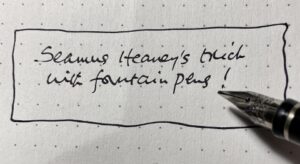Gone Fishin’?
Quote of the Day
”No rules, however wise, are a substitute for affection and tact.”
- Bertrand Russell
Musical alternative to the morning’s radio news
Mozart | Soave sia il vento | Cosi fan Tutte
Long Read of the Day
Remembering Pope Benedict’s Challenge
As long-time readers will probably realise, I am not a fan of organised religion. But I am also increasingly appalled by the moral bankruptcy of the neoliberal economic machine that is currently running — and ruining — our lives, not to mention the planet. How is it possible that we tolerate what is being done to our societies — the unfairness, the social exclusion, the poverty, the unconscionable levels of inequality, the hypocrisy and dishonesty of those in power — even in so-called democracies like the UK? And to think that this is happening in societies that are wealthy enough easily to eliminate many of these social ills if we really wanted to. What are the values that are implicit in our tacit acceptance of this? And where did we get them from?
All of which is a long-winded way of explaining why I was struck by this Editorial in Noema magazine by its Editor, Nathan Gardels. It’s about a long-running disagreement between the former Pope Benedict (aka Ratzinger) and political philosophers like Jürgen Habermnas, who I guess is the nearest thing we liberals have to a pontiff. The core of the disagreement is the question of where do we get our values from? Ratzinger’s argument is that, in the end, the deliberative, consensual process that Habermas envisages as the source of them is (a) inadequate and (b) in so far as it has a reality it actually derives from our shared histories as former Christian cultures.
It’s a very interesting read IMO. And a reminder of what a good magazine Noema is.
Books, etc.
From Laleh Khalili’s LRB review of When McKinsey Comes to Town: The Hidden Influence of the World’s Most Powerful Consulting Firm by Walt Bogdanich and Michael Forsythe.
”Bogdanich and Forsythe’s book is a damning account of the way McKinsey has made workplaces unsafe, ditched consumer protections, disembowelled regulatory agencies, ravaged health and social care organisations, plundered public institutions, hugely reduced workforces and increased worker exploitation. It begins with an account of McKinsey-driven cost-cutting at US Steel, which led to the deaths of two steelworkers. Similar measures at Disney resulted in a young man being crushed to death on the Big Thunder Mountain rollercoaster. Decades after the consequences of smoking became clear, McKinsey continued to work for the big tobacco producers. As the extent of the US opioid epidemic became apparent, McKinsey advised Purdue Pharma to find ‘growth pockets’ where OxyContin could be more easily prescribed, and lobbied regulators for laxer rules on prescriptions. McKinsey’s unethical activities pack the pages of this book, while its supercilious vocabulary of ‘values’ and ‘service’ runs like an oil slick over slurry.
The primary product sold by all management consultants – both software developers and strategic organisers – is the theology of capital. This holds that workers are expendable. They can be replaced by machines, or by harder-working employees grateful they weren’t let go in the last round of redundancies. Managers are necessary to the functioning of corporations – or universities, or non-profit organisations – and the more of them the better. Long working hours and bootstrap entrepreneurialism are what give meaning to life. Meritocracies are a real thing. Free trade, laissez-faire capitalism and reduced regulation are necessary stepping stones towards the free market utopia. There is also a faith that this work is helping ‘create positive, enduring change in the world’, as McKinsey’s mission statement puts it.”
Spot on.
Thanks to Andrew Curry (Whom God Preserve) for alerting me to it.
My commonplace booklet
Joseph Weizenbaum’s Original ELIZA code
If, like me, you’ve always been fascinated by Joe Weizenbaum’s famous computer-based Rogerian therapist, ELIZA, then you’ll enjoy this.
This Blog is also available as a daily email. If you think that might suit you better, why not subscribe? One email a day, Monday through Friday, delivered to your inbox. It’s free, and you can always unsubscribe if you conclude your inbox is full enough already!












